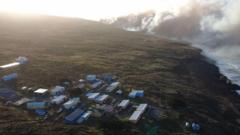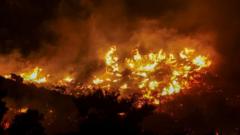Authorities scramble to control the flames and assess ecological damage as evacuations take place.
Wildfires Ravage Amsterdam Island, Threatening Biodiversity in the Indian Ocean

Wildfires Ravage Amsterdam Island, Threatening Biodiversity in the Indian Ocean
A month-long wildfire has engulfed over half of Amsterdam Island, home to vital scientific research and rich wildlife.
As of early February, Amsterdam Island, a remote French territory in the Indian Ocean, has been under siege by wildfires for nearly a month. The island, situated roughly midway between Madagascar, Antarctica, and Australia, has witnessed flames engulfing over 55% of its 54 square kilometers. Lacking a permanent population, Amsterdam Island is primarily utilized for scientific research, with researchers stationed there since the 1980s.
The catastrophe first erupted on January 15, reported by a scientist at the Pointe Bénédicte observatory, which monitors greenhouse gases and other atmospheric constituents. In the wake of these fires, 31 people have been evacuated to Réunion Island, prompting French authorities to launch efforts in both firefighting and impact assessment.
Rémi Chazot, a computer scientist on the island, noted the fortunate timing of a lobster fishing vessel that was nearby and rescued the researchers. "This boat should have left a week earlier, but it had not caught its lobster quota," Chazot explained, highlighting the precariousness of their situation.
The island's dry and windy conditions, with gusts reaching 40 km/h (24 mph), have exacerbated the fire's spread, which is suspected to have moved through the island's extensive peat bogs. Although full damage estimates are not available yet, preliminary satellite imagery indicates destruction to solar panels and crucial food and communication infrastructure.
Conservationists warn that the ecological ramifications could be severe, given the island's rich biodiversity. Amsterdam Island serves as a breeding ground for species including southern elephant seals and various albatrosses, most notably the Amsterdam Albatross. The region is a sanctuary for 84% of the world’s yellow-nosed albatross population and is also home to a colony of southern rockhopper penguins.
Due to its unspoiled environment, the island is integral to atmospheric research, making the suspension of such activities—unprecedented in 45 years—particularly troubling. "The delay will significantly hinder our data acquisition," stated Marc Delotte, head of the atmospheric research team.
On February 7, a reconnaissance mission, including four firefighters and seven technical crew members, departed on a French navy vessel to secure the settlement and determine the fire's origin. As they aim to restore energy and water supplies, the future of Amsterdam Island's unique ecosystem hangs in the balance as efforts continue to combat the devastating wildfires.
The catastrophe first erupted on January 15, reported by a scientist at the Pointe Bénédicte observatory, which monitors greenhouse gases and other atmospheric constituents. In the wake of these fires, 31 people have been evacuated to Réunion Island, prompting French authorities to launch efforts in both firefighting and impact assessment.
Rémi Chazot, a computer scientist on the island, noted the fortunate timing of a lobster fishing vessel that was nearby and rescued the researchers. "This boat should have left a week earlier, but it had not caught its lobster quota," Chazot explained, highlighting the precariousness of their situation.
The island's dry and windy conditions, with gusts reaching 40 km/h (24 mph), have exacerbated the fire's spread, which is suspected to have moved through the island's extensive peat bogs. Although full damage estimates are not available yet, preliminary satellite imagery indicates destruction to solar panels and crucial food and communication infrastructure.
Conservationists warn that the ecological ramifications could be severe, given the island's rich biodiversity. Amsterdam Island serves as a breeding ground for species including southern elephant seals and various albatrosses, most notably the Amsterdam Albatross. The region is a sanctuary for 84% of the world’s yellow-nosed albatross population and is also home to a colony of southern rockhopper penguins.
Due to its unspoiled environment, the island is integral to atmospheric research, making the suspension of such activities—unprecedented in 45 years—particularly troubling. "The delay will significantly hinder our data acquisition," stated Marc Delotte, head of the atmospheric research team.
On February 7, a reconnaissance mission, including four firefighters and seven technical crew members, departed on a French navy vessel to secure the settlement and determine the fire's origin. As they aim to restore energy and water supplies, the future of Amsterdam Island's unique ecosystem hangs in the balance as efforts continue to combat the devastating wildfires.




















